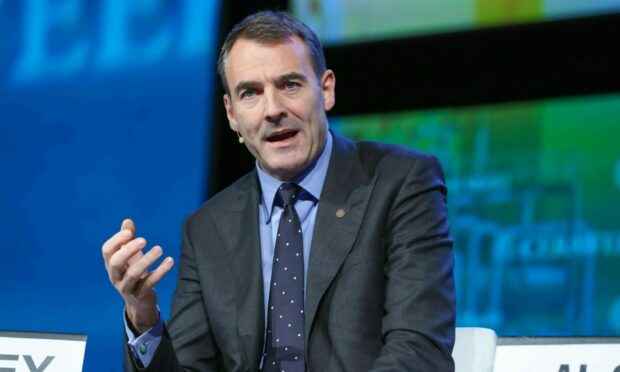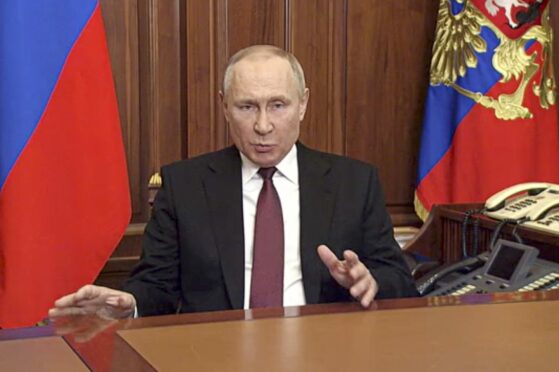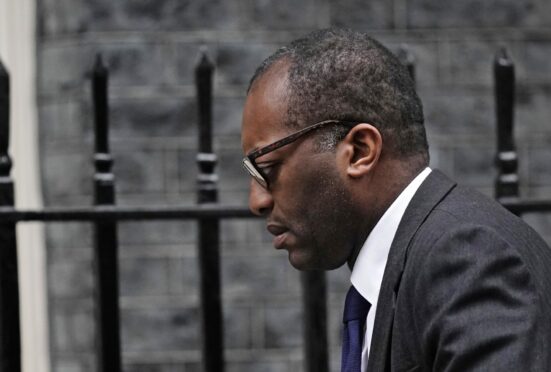BP’s principled stand to walk away from its investments in Russia’s state-owned oil firm will cost it dear but is setting the trend for other Western energy companies as war escalates in Europe.
The move is a major shift for the energy company which has been the biggest foreign investor in Russia since 2013.
Impact on the firm’s shares was limited – down just less than 4% as markets closed.
The price of a barrel of Brent crude touched a high of $105.07 a barrel in early trading as Western allies imposed more sanctions on Russia and blocked some Russian banks from a global payments system, which could cause severe disruption to its oil exports.
BP’s decision to walk away from its stake in the state-owned oil and gas company, Rosneft, will undoubtedly affect its strategy as it shifts away from oil and gas to low-carbon fuels and renewables energy.
Although it will immediately benefit from higher oil prices, BP estimates dropping ties with Russia could cost it up to $25 billion (£18.7bn).
Rosneft accounts for around half of BP’s oil and gas reserves and a third of its production.
The company currently has around 200 employees in Russia, most of whom are local staff.
BP’s boss Bernard Looney said its “immediate priority is caring for our great people in the region and we will do our utmost to support them”.
Under pressure
BP’s decision came after it came under pressure from the UK Government.
Business secretary Kwasi Kwarteng held a virtual call with BP chief executive Mr Looney for around 20 minutes on Friday to discuss the company’s position.
Following board meetings on Friday and Sunday, BP took the decision to walk away from its investment.
Mr Looney and his predecessor as chief executive, Bob Dudley, have also resigned from the board of Roseneft.
The right thing to do
In a statement issued Sunday evening, Mr Looney said: “Like so many, I have been deeply shocked and saddened by the situation unfolding in Ukraine and my heart goes out to everyone affected.
“It has caused us to fundamentally rethink BP’s position with Rosneft.
“I am convinced that the decisions we have taken as a board are not only the right thing to do, but are also in the long-term interests of BP.”
Others follow suit
BP has the some of the highest exposure to Russian oil and gas among Western energy firms, but others are also now withdrawing their support from businesses owned by or operating in the state as Russia ups its aggression against its its neighbour.
Last night Norwegian oil giant Equinor moved with BP and said its position has become “untenable” amidst the country’s invasion of Ukraine.
Equinor has been in Russia for more than 30 years and entered into a co-operation agreement with state-owned Rosneft in 2012.
Other familiar North Sea operators also have strong links to Russia, such as French energy firm, TotalEnergies which holds 19.4% of Novatek, Russia’s second-largest natural gas producer.
It accounts for around 5% of the French supermajor’s oil production, and 30% of its natural gas.
Speculation has risen that Shell may have to write off up to $1 billion it has invested in the Nord Stream 2 pipeline, built by the Russian state gas firm, Gazprom.
Shell funded 10% of the cost of constructing the 750-mile pipeline under the Baltic Sea, which is designed to double the flow of gas from Russia directly to Germany.
It also has a significant stake in the Sakhalin-2 liquefied natural gas project in Russia’s far east. It is the state’s first offshore gas project and is owned by Gazprom, Shell, Mitsui and Mitsubishi.


